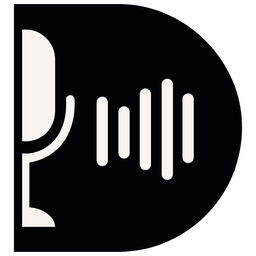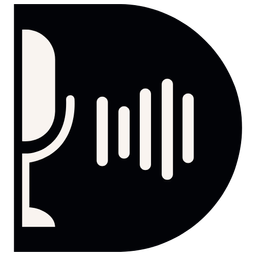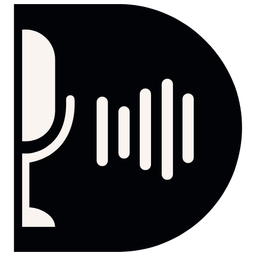Top 10 Open-Source Alternative to Vapi AI in 2025
Vapi is a developer centric voice ai platform for building, deploying high performance voice agents. Vapi comes with an overall rating of 2.5 / 5 on Trustpilot. One user says “terrible customer service bot!! no support for UK to buy numbers. terrible service”.
Vapi platform makes you pay for both its platform and external APIs (STT, LLM, TTS), making voice bot scaling costly for businesses. Vapi charges $0.05/min plus separate fees for STT, LLMs, and TTS pushing total costs above ($0.23/min - $0.33/min) at scale, far higher than competitors.
Vapi is not an open source platform, there are some Reddit users who say “Vapi is pretty good for very mechanical and general use cases (like restaurant ordering)”. In this blog, we’ll explore Vapi key drawbacks and share more affordable, scalable open source alternatives for building better voice AI solutions.
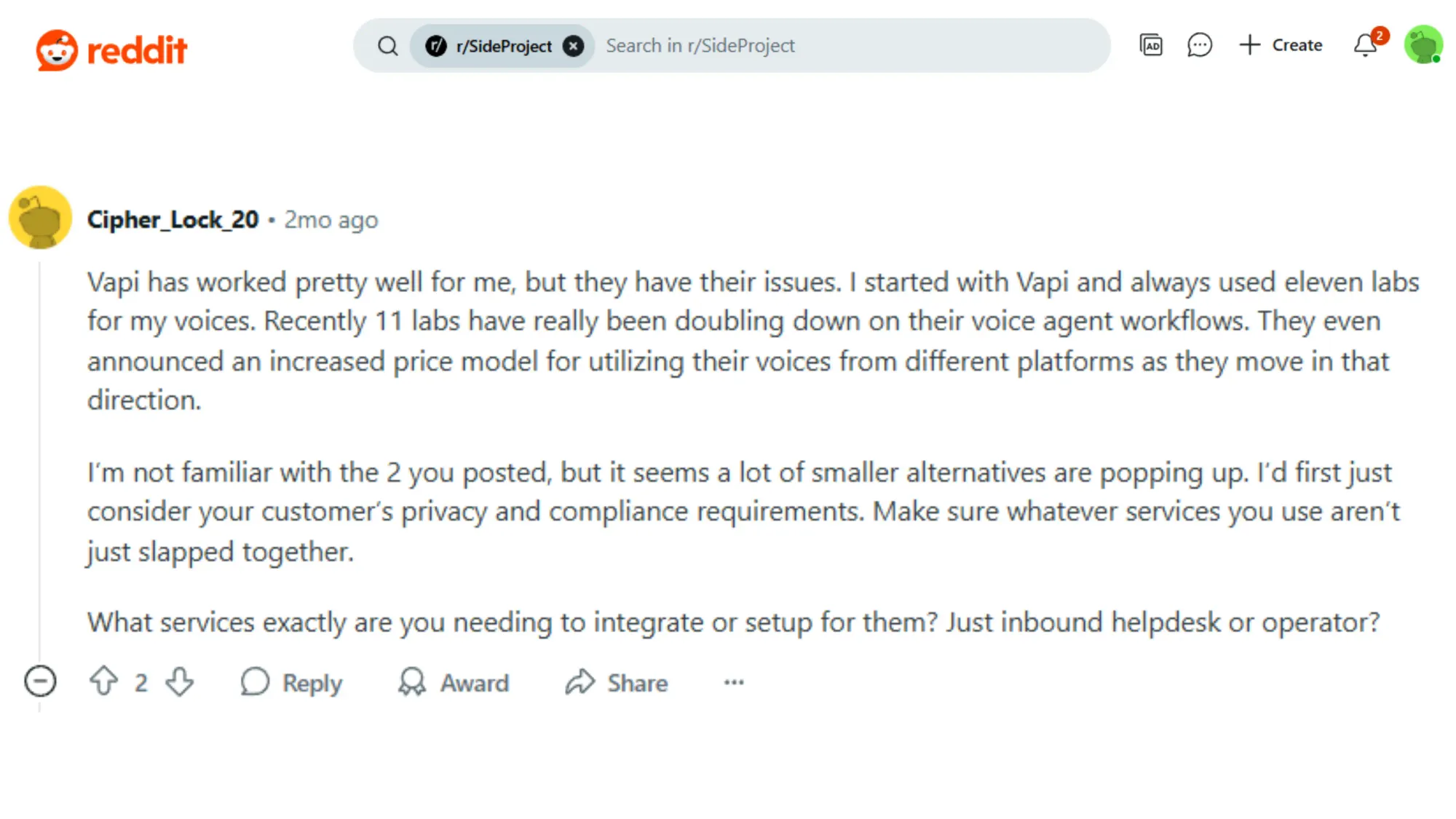

List of Alternatives
- Dograh AI
- Vocode.dev
- SpeechBrain
- Mycroft
- OpenAssistant
- Jasper
- LinTO
- Rhasspy
- Aimybox
- Leon

Conversational AI Collective
Best Vapi AI Alternative Recommendation
If you're looking to automate your conversational workflows or seeking a Vapi alternative, here are 10 top options. We've reviewed each AI agent based on key features, pros, ideal users, challenges and pricing.
1. Dograh AI
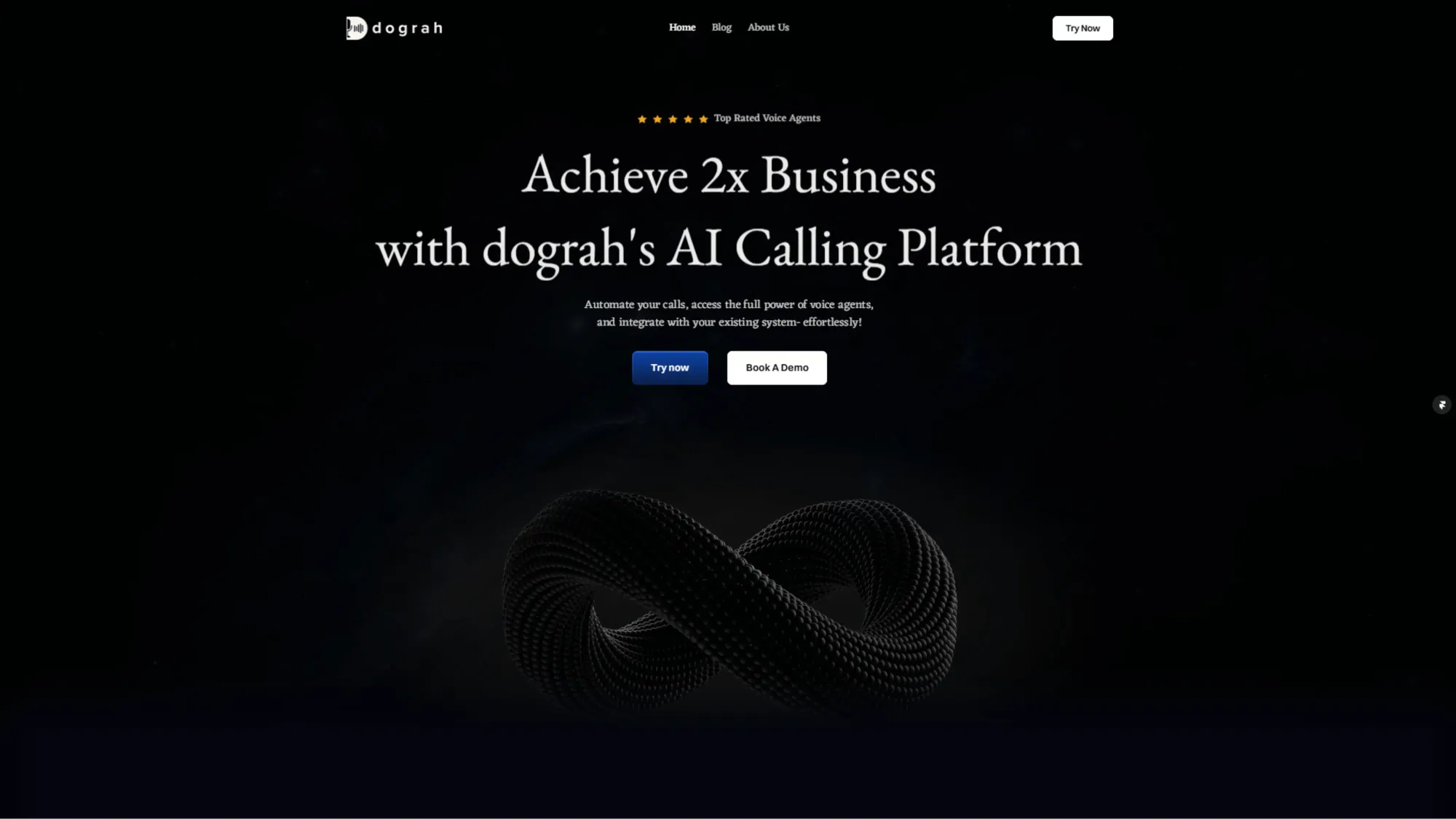
Dograh stands out as a powerful open source alternative to Vapi with several advantages :
- Open Source - Dograh is an open source voice ai platform giving full flexibility to developers to customize, self host and extend features.
- Easy to Use and Dependability - With AI to AI testing (over calls) and feedback loop through call summary, it is fairly easy to build extremely dependable bots with Dograh AI. Also this helps cut down on time needed to build the voice agent, and significantly improves time to market.
- LoopTalk - Think AI calling AI. Dograh’s LoopTalk auto-tests voice bots using AI-driven customer personas to simulate real-world scenarios boosting accuracy and letting you get started in minutes.
- No Double Billing - Dograh offers an open source solution to self host. And its cloud solution has transparent pricing with no double billing charges for STT, TTS and LLM.
- End-to-End Support - Dograh’s professional team offers end-to-end support from integration and workflow setup to analytics and optimization.
- Faster Setup - Dograh offers drag and drop workflow builder UI and prebuilt workflow as per your business needs.
Key Features
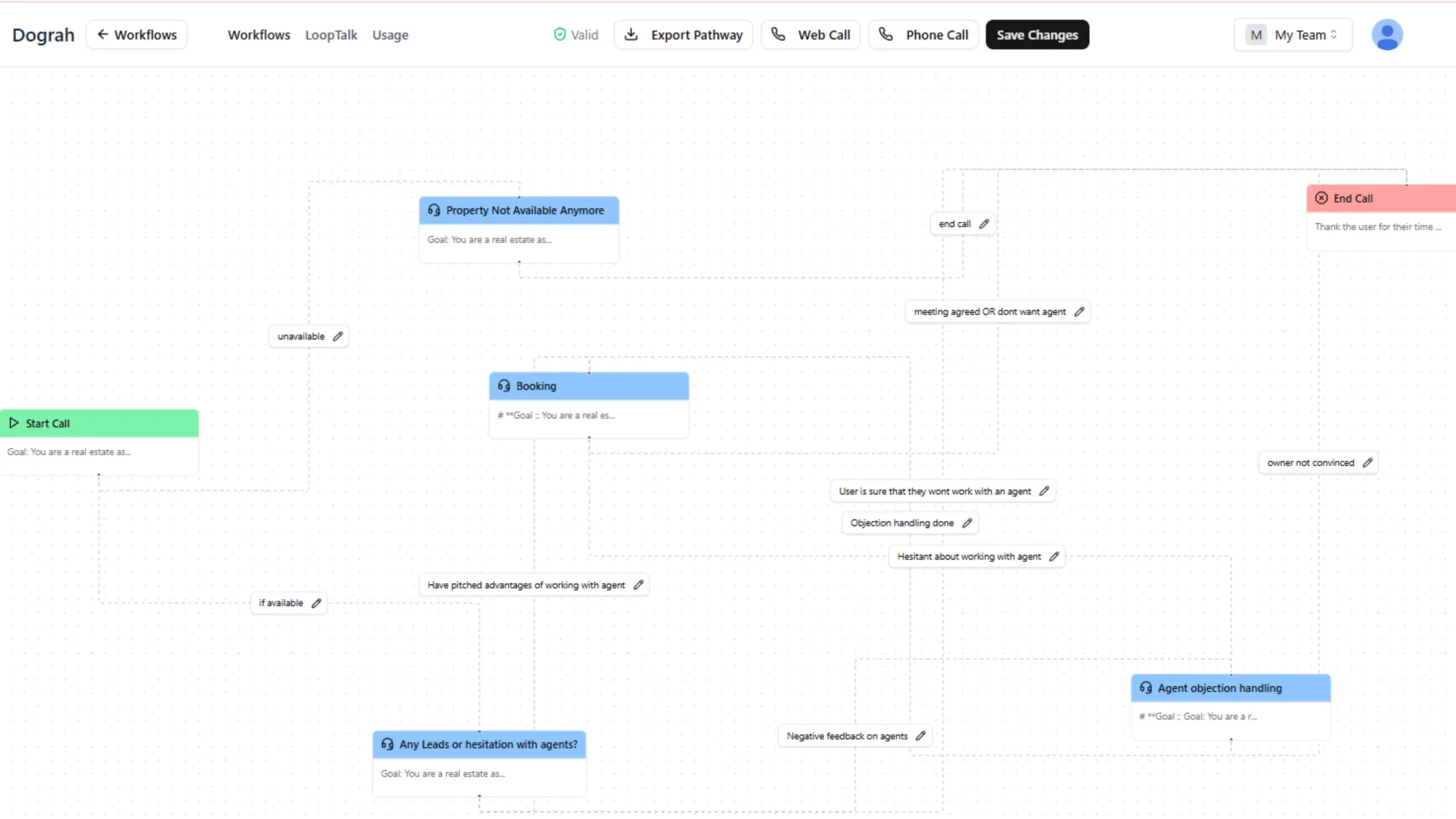
- NEPQ led Sales - Uses Neuro-Emotional Persuasion Questioning (NEPQ) to drive deeper engagement and guide conversations effectively.
- Real-Time Response - Dograh enables low-latency (<500ms), human-like voice conversations for seamless user interactions.
- Longer Conversation - Dograh multi-agent bots can handle calls up to 45 minutes, maintain full context throughout conversations without hallucinations.
- Human Like Speech - Pauses, Filler words & clear tone for realistic, engaging voice interactions.
- Emotionally Effective - Understand user concerns by actively empathizing and probing their pain points to deliver more personalized, effective voice interactions.
- Tailor-Made Build - Dograh experienced team offers hands-on support to help you design and deploy custom voice agents tailored to your scripts and business needs.
- Multilingual Voice Support - Support multilingual voice agents using top STT and TTS providers, enabling natural and fluent conversations for diverse global audiences.
- Expert Cloud Support - Get expert cloud support with Dograh test and refine your voice agent in real time using our intuitive, cloud-hosted interface.
- Flexible Deployment Option - Dograh supports both cloud and open-source deployments, giving you flexibility based on your business and technical needs.
- Customer Support - Dograh’s dedicated support team ensures your Voice AI runs smoothly from setup to ongoing updates with fast, reliable assistance.
- Data Privacy - Your data privacy is our top priority. Dograh’s open source solution helps adhere to strict GDPR and HIPAA standards to keep your information secure and fully compliant.
Ideal Users
- Real Estate Agent
- Customer Support
- Sales and Marketing Automation
- Tech Support
- Finance, Insurance and Banking
- E-Commerce
- Healthcare
- Logistics & Home Services
- Travel & Hospitality
Pricing
Dograh offers an open source solution without any platform charges. This makes it more cost-effective, customisable and scalable compared to Vapi.
Quick Comparison Table
Migrate from BLAND AI: Save upto 90% time with Dograh Voice AI.
Dograh offer an open-source, no-code Voice AI builder that lets you control and deploy voice agents in minutes with reliable multi-agent conversational flows.
2. Vocode.dev
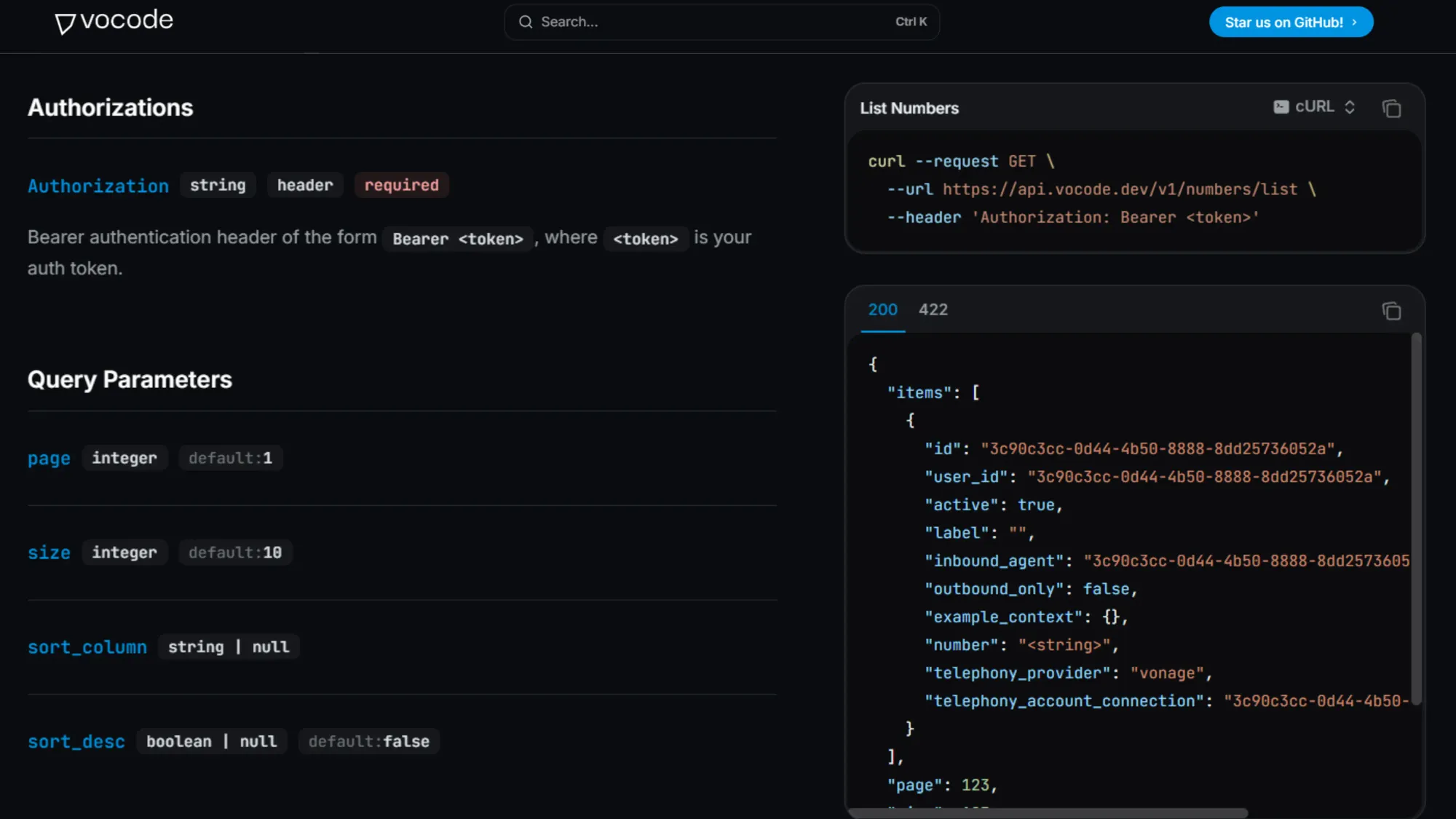
Vocode, founded in 2023 by Kian Hooshmand and Ajay Raj, is an open-source Voice AI platform that makes it easy for developers to build voice-driven applications. With Vocode, developers can seamlessly integrate realistic voice AI into product workflows or even automate phone calls in as little as 10 lines of code. Vocode mission is to build the most realistic, production-ready conversational voice AI to power the future of human computer interactions.
Key Features :
- Vocode is an open source library for building voice agents.
- Vocode lets you build LLM-powered voice apps like phone agents, assistants, and Zoom bots.
- Vocode provides conversation abstractions (streaming, turn-based).
- Vocodde offers conversation functionality (endpointing, emotion tracking).
- Help in integrations to all of the best speech-to-text/text-to-speech providers.
- Offers cross-platform support (telephony, web, Zoom).
- The Vocode hosted service allows you to automate inbound/outbound calls via API.
3. SpeechBrain
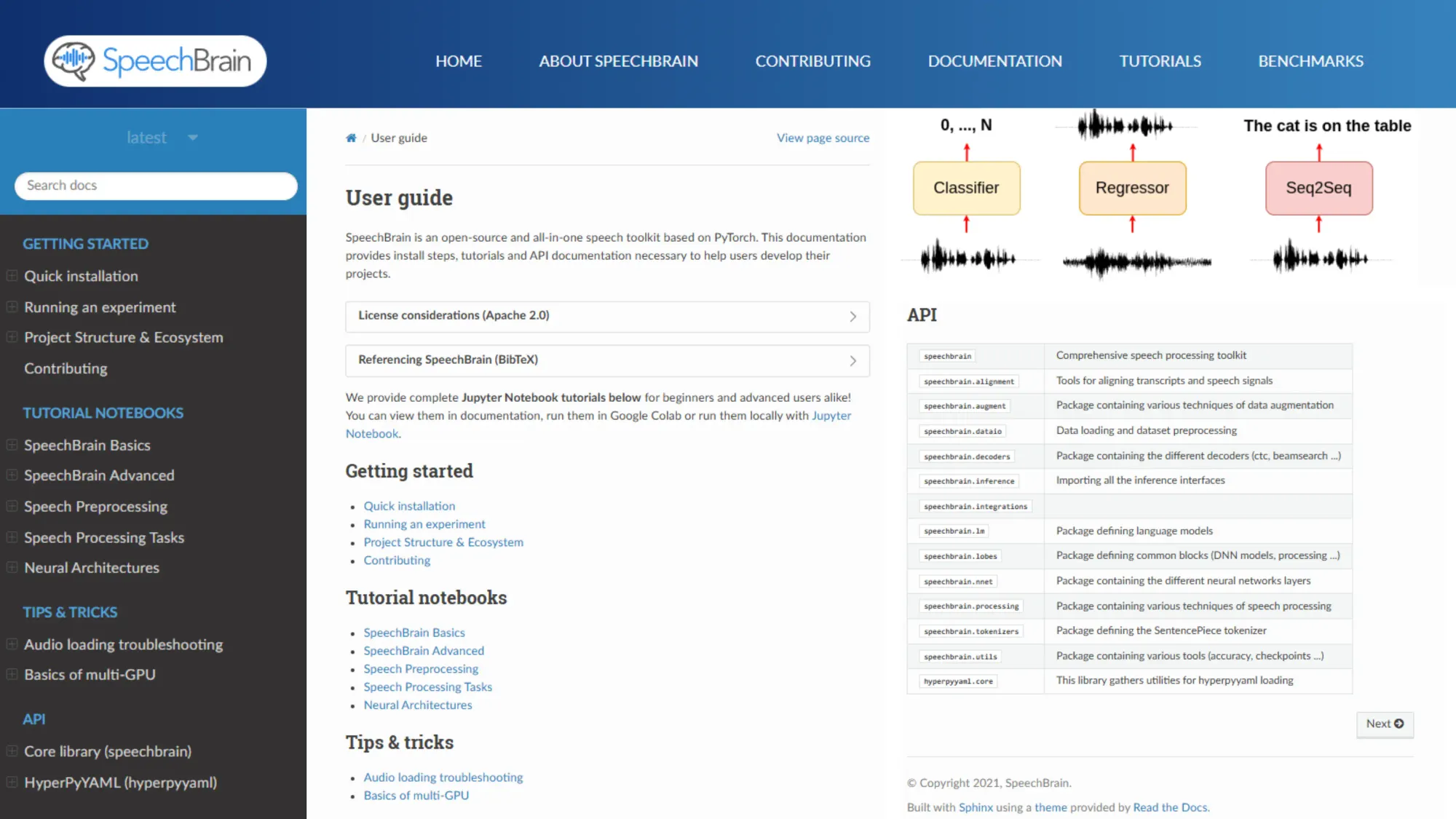
SpeechBrain, created in 2020 by Dr. Mirco Ravanelli and Dr. Titouan Parcollet, is an open-source toolkit for conversational AI and speech processing. It supports a wide range of tasks, including speech recognition, text-to-speech, speaker recognition, speech enhancement, separation, diarization, spoken language understanding, and speech-to-speech translation. Released under the Apache 2.0 license, SpeechBrain is free for personal, academic, and commercial use.
Key Features :
- SpeechBrain supports cutting-edge speech tasks like recognition, enhancement, separation, TTS, speaker ID, translation and SLU.
- It includes audio tech such as vocoding, augmentation, feature extraction, sound detection, beamforming, and multi-mic processing.
- Provides tools for training LMs, from n-grams to LLMs, with easy integration into speech pipelines and chatbot creation.
- Uses advanced deep learning methods like self-supervised, continual, diffusion, Bayesian and interpretable models.
- Accelerates Conversational AI R&D with pre-built recipes, datasets, docs, and tutorials for newcomers.
- Offers pre-trained models with simple interfaces for transcription, speaker verification, enhancement and separation.
4. Mycroft
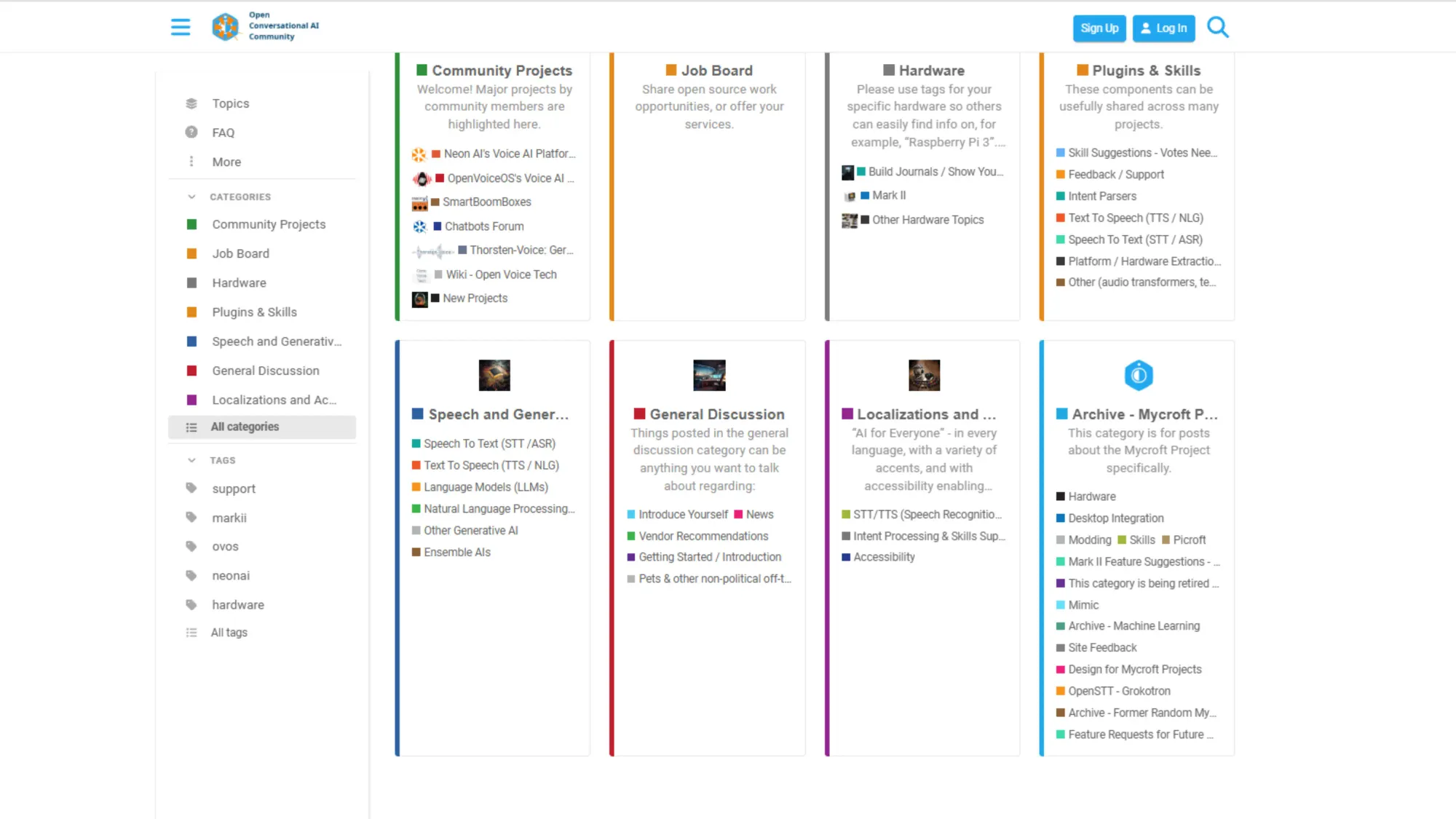
Mycroft is an open-source artificial intelligence voice assistant, giving users full freedom, flexibility, and control over how it works. Its code can be inspected, copied, modified, and contributed back to the community, making it truly AI for everyone. While some platforms restrict customization, Mycroft empowers users to create and adapt Skills as they choose. The project is licensed under the Apache 2.0 open-source license.
Key Features :
- Mycroft uses opt-in privacy so your voice is only recorded with permission. You can opt in to share anonymized recordings to improve accuracy, or opt out entirely.
- Mycroft runs on many platforms and devices, including Raspberry Pi, Android, and Linux desktops.
- Mycroft is lightweight and runs on low-powered devices like the Raspberry Pi 3, making it ideal for hackers, makers, and hobbyists.
- Mycroft has a vibrant and supportive community you can join through:
- For Chat: https://chat.mycroft.ai
- Forum: https://community.mycroft.ai
- Open-source, modular voice assistant framework with wake word detection, STT, intent parsing, and TTS.
- Ideal for fully self-hosted, customizable, and adaptable voice systems.
5. OpenAssistant
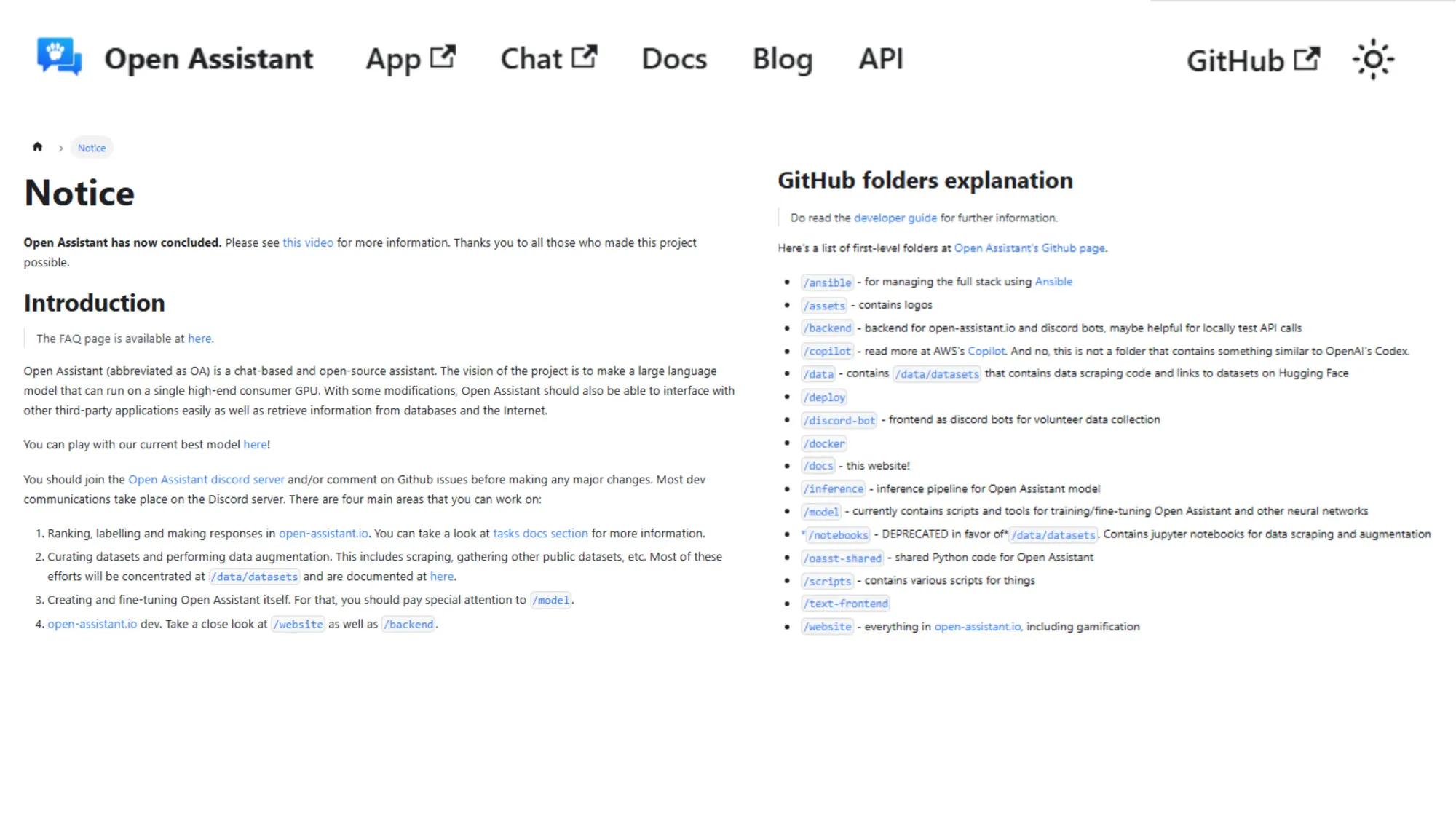
Open Assistant (OA), founded by Yannic Kilcher on April 15, 2023, is a chat-based open-source assistant. Its vision is to create a large language model capable of running on a single high-end consumer GPU. With some adjustments, OA can also connect with third-party applications, retrieve information from databases, and access the Internet. The system is built around three main components: boot mind, root mind, and user minds.
Key Features :
- Open Assistant comprises three primary components as; boot mind, root mind, and user minds.
- Cutting-edge chat assistant, customizable to clients needs.
- Uses search engines and external, upgradeable knowledge with no billions of parameters required.
- A developer-friendly building block, easily integrate Open Assistant into your application.
- The document outlines OpenAssistant’s data schemas, defined in Python but adaptable to JSON, XML, SQL, Parquet, or other formats.
- The LAION-AI/Open-Assistant GitHub repo offers diverse, accessible datasets for training OpenAssistant models.

6. Jasper
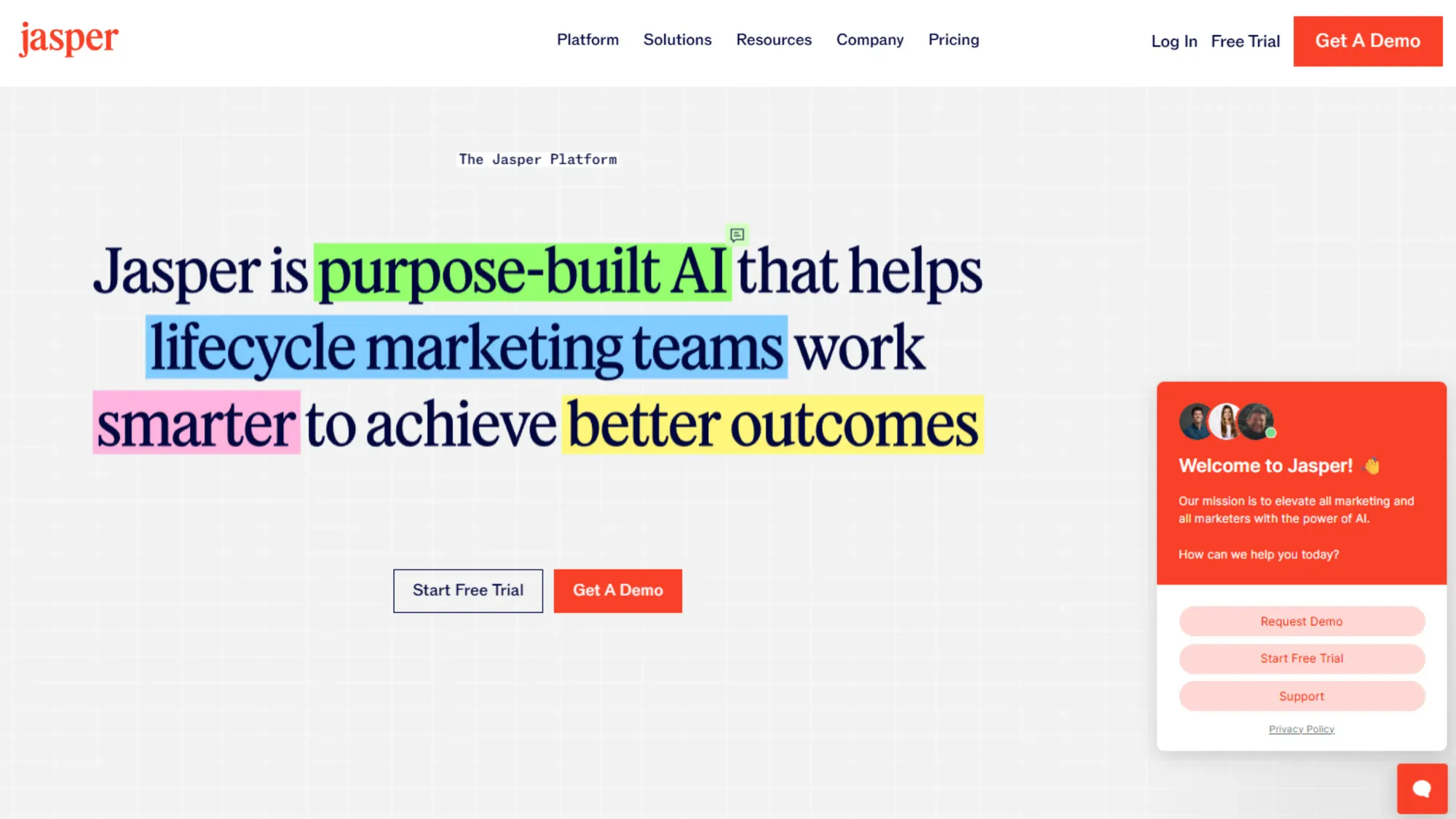
Jasper, founded by Dave Rogenmoser, Chris Hull, and John Phillip Morgan in January 2021, is an AI platform that streamlines brand experiences, speeds up content creation and automates marketing at scale. As the industry’s first intelligent, intuitive workspace for marketers, Jasper uses AI agents to optimize processes while ensuring content remains resonant and compliant. It helps creators and companies of all sizes expand their creative potential.
Key Features :
- Generates blog posts, ads, emails, product descriptions, and more using 50+ adaptable content templates.
- Jasper on custom voices, ensuring all output matches brand and audience requirements.
- Securely integrates company strategy, product info, competitor insights, and audience profiles into content.
- Features autonomous agents for SEO, personalization, and automated research.
- Automates tasks, streamlines workflows, and scales with growing content or engagement.
- Supports voice recognition, TTS, translation, transcription, and conversational AI for better interaction and accessibility.
7. LinTO
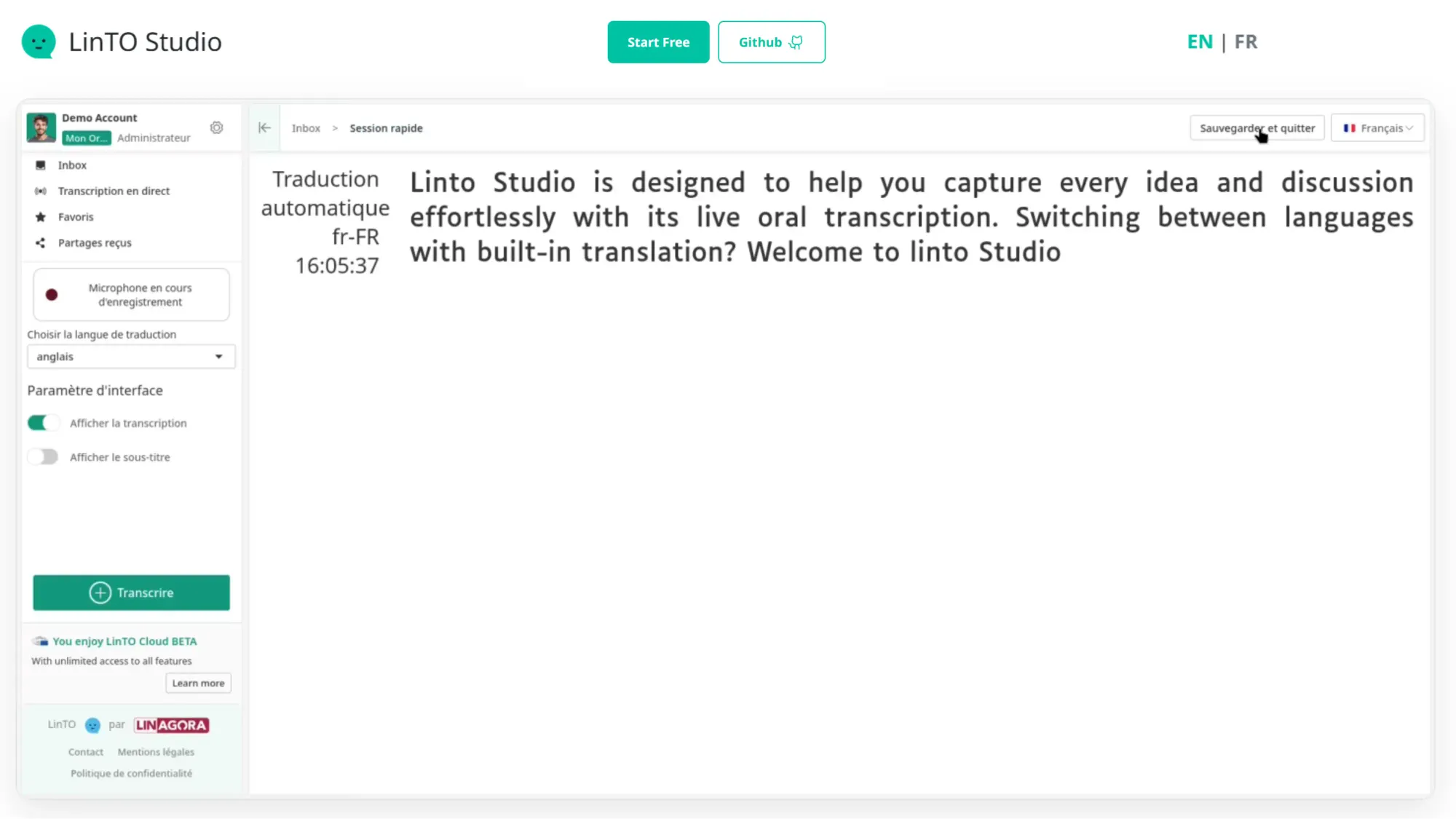
LinTo.ai is an open-source, modular voice technology ecosystem that delivers AI-powered solutions for transcription, speech recognition, live subtitling, summarization, media management and smart assistants, tailored for business, collaboration and accessibility. Real-time and offline transcription from audio or video using high-performance models like Kaldi, Whisper, and proprietary engines.
Key Features :
- Automates captioning and subtitle sync for video calls with Jitsi and other conferencing tools.
- Uses LLMs to summarize long media, giving concise overviews and actionable insights from meetings.
- Enables team-based real-time editing and annotation of transcriptions and subtitles with full media management.
- LinTO Agents enable smart voice interactions, wake-word detection and automation for reports, rooms, and facilities.
- Offers ready-made APIs (ASR, TTS, NLU, etc.) and Docker images for easy deployment.
- Self-hosted deployments give businesses full control over data privacy and security.
8. Rhasspy
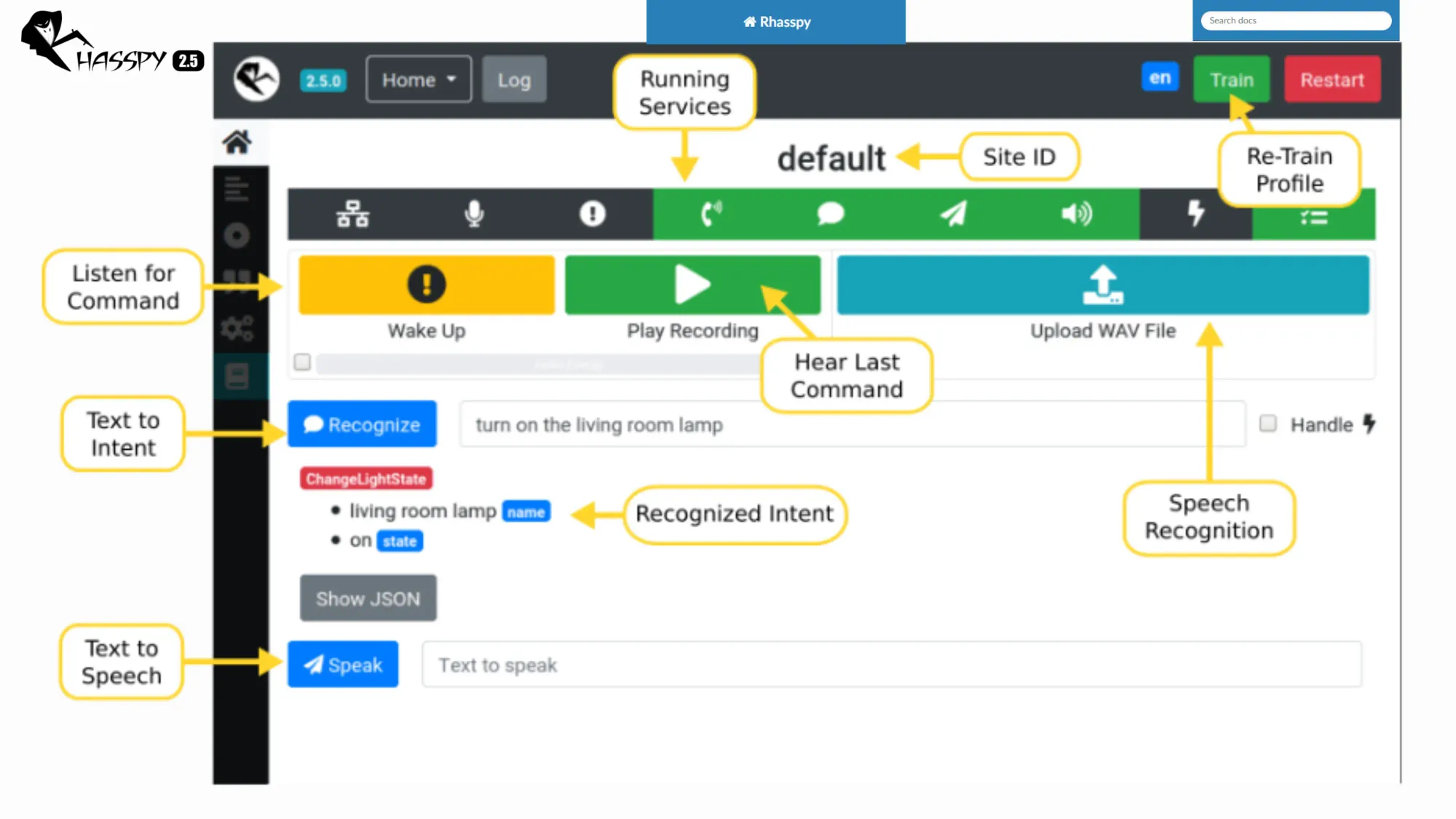
Rhasspy is a fully open-source, offline voice assistant built for home automation enthusiasts and advanced users who value privacy, customization, and smart home integration. It features a sleek web interface for remote configuration, programming, and testing, with all functionality accessible through a full HTTP API.
Key Features :
- Operates fully offline, with all voice recognition and command processing handled locally to ensure privacy and security.
- Users create commands with a simple template language, resolve into intents to trigger smart home actions.
- Rhasspy supports 13+ languages with extensible speech recognition models like Pocketsphinx and Kaldi.
- Works with Home Assistant, Node-RED, Jeedom, OpenHAB, and more via MQTT, Websockets, HTTP, or REST for home control.
- Offers a web UI, REST/Websocket APIs, community enhancements, and support for custom, extendable speech modules.
9. Aimybox
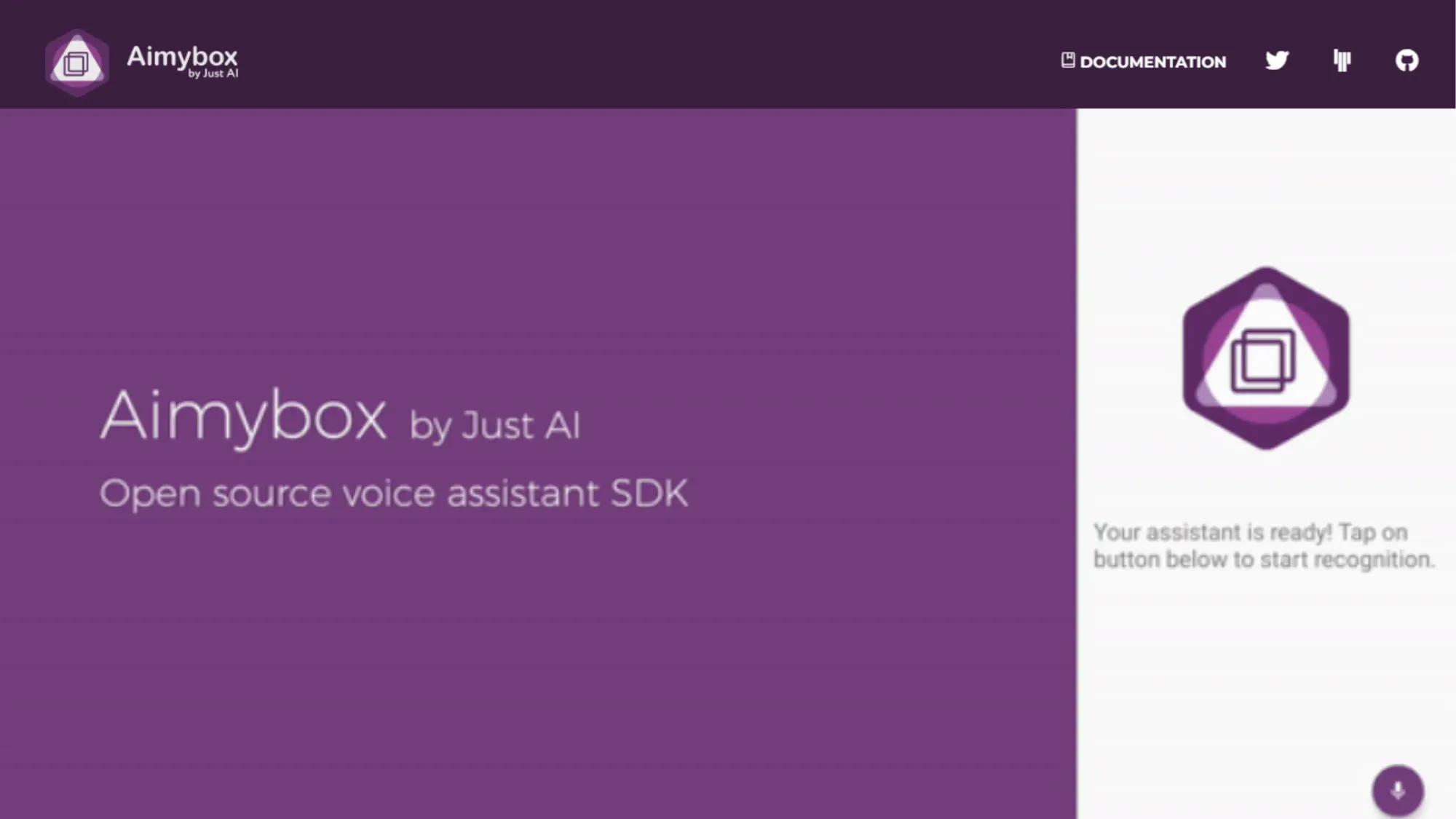
Aimybox is an open-source voice assistant SDK with a ready-to-use UI that lets you create and embed custom voice assistants into any application or device, from robots to Raspberry Pi. It enables developers to quickly build and customize assistants for Android, iOS, web apps, or connected devices. Independent of specific STT, TTS, or NLU providers, Aimybox supports both built-in modules and third-party engines like Google, Houndify, Snowboy, and Dialogflow.
Key Features :
- Full-stack platform for building intelligent AI systems.
- Combines AI, natural language understanding, and machine learning in one interface.
- Easily connects to any STT, TTS, and NLU engines for full flexibility.
- Provides ready-to-use UI components and a voice skills platform for great UX.
- Apache 2.0 licensed, built in Kotlin & Swift with open repos and docs for collaboration.
- Easily embeddable into any Android app or device.
- Aimybox custom voice skills can access local device services and networks.
10. Leon
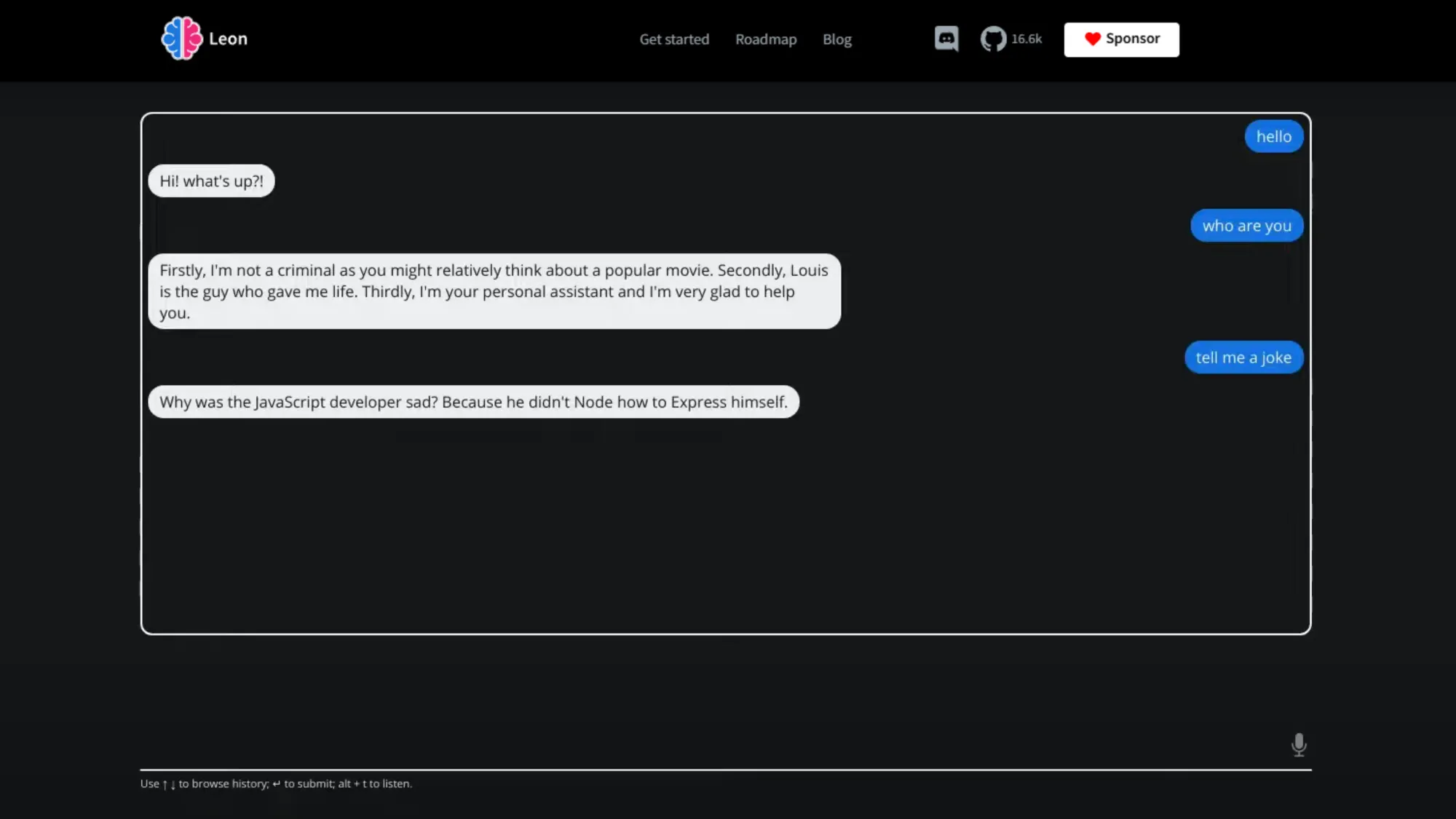
Leon is an open-source personal assistant that runs on your own server (Linux, macOS, Windows), keeping data private and secure. Its modular "skills" system lets users and developers create, share, and use mini-apps to extend functionality, enabling endless customization for specific workflows.
Key Features :
- Leon uses AI (NLP, STT, TTS) for smooth conversations and task automation.
- Supports voice/text commands and works across multiple platforms and devices.
- Leon works fully offline with open-source TTS/STT engines for privacy and reliability.
- Open-source (MIT) with an active community, Leon is highly extensible for developers.
- Gitpod automatically sets up an environment and runs an instance for you.
- Leon CLI simplifies setup and guides you through installation.
What Should You Look For In Vapi AI Alternatives ?
- Pricing transparency and cost control without hidden charges.
- Ease of building a voice bot and Reliability of the bot.
- Simple Setup with No-Code/Low-Code Options.
- Clear Voice, Low Latency and Natural Speech.
- Seamless integration and workflow automation.
- Security, compliance and deployment option.
- AI-Powered Insights and Optimization with Built-In Testing Tools (e.g., LoopTalk).
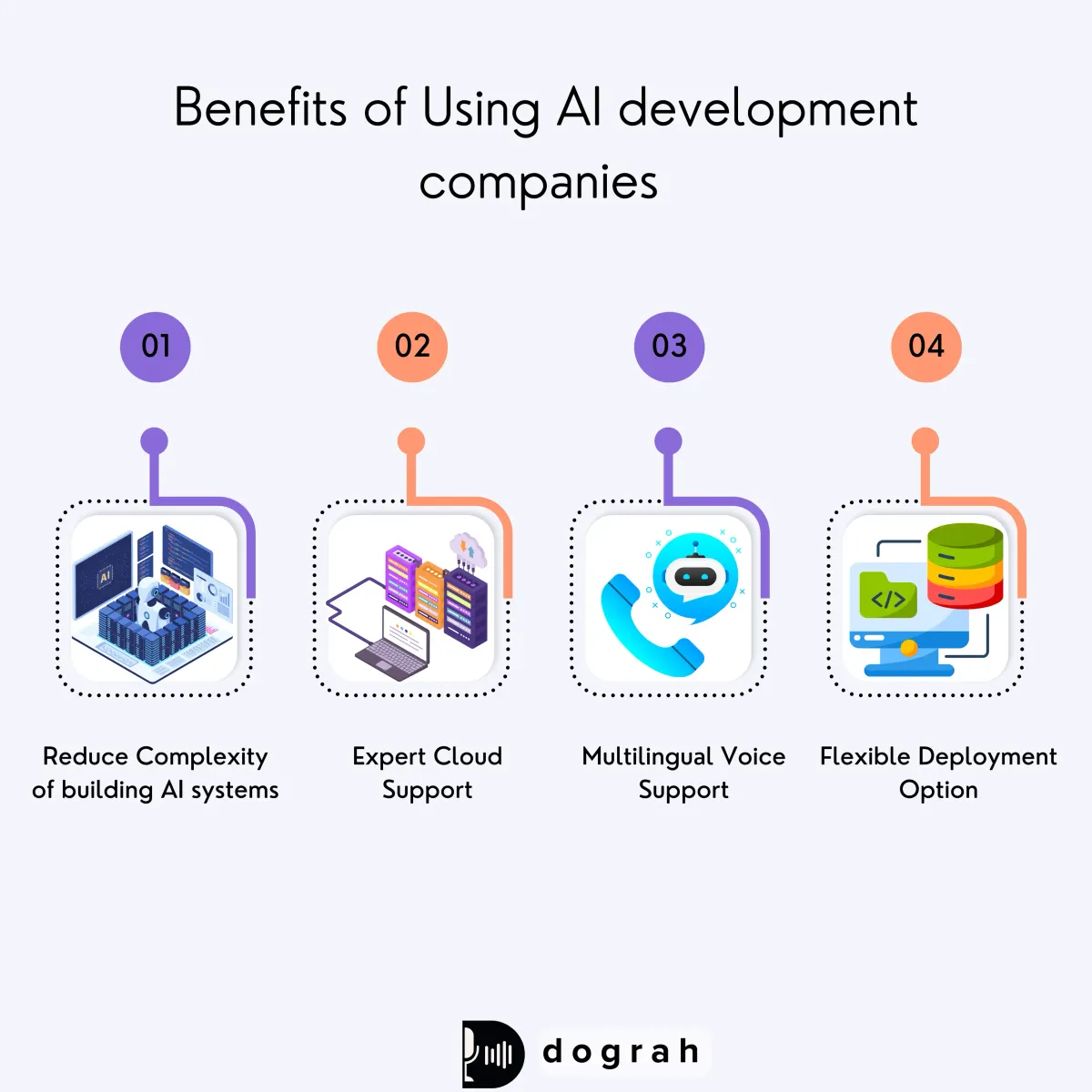
Top 10 Voice AI Calling Development Companies
What to Look for in a Modern Voice Orchestration Platform
Enhanced Usability and No-Code Setup
Modern AI voice platforms offer no-code/low-code visual builders, letting non-developers quickly design and deploy voice agents using drag-and-drop editors, templates and guided setup, cutting time-to-market and dev effort.
High-quality AI phone agents
A great AI voice platform delivers natural, low-latency (under 500ms) speech with realistic human-like tone, pauses, and emotional nuance, it is crucial for long, multi-turn conversations using NEPQ-led persuasion without losing context or drifting off-topic.
Transparent & Low Pricing
Transparent pricing is essential for businesses aiming to scale efficiently. Many modern AI voice platforms offer bundled pricing that includes STT, TTS and LLM usage. This eliminates hidden costs and avoids double billing issues.
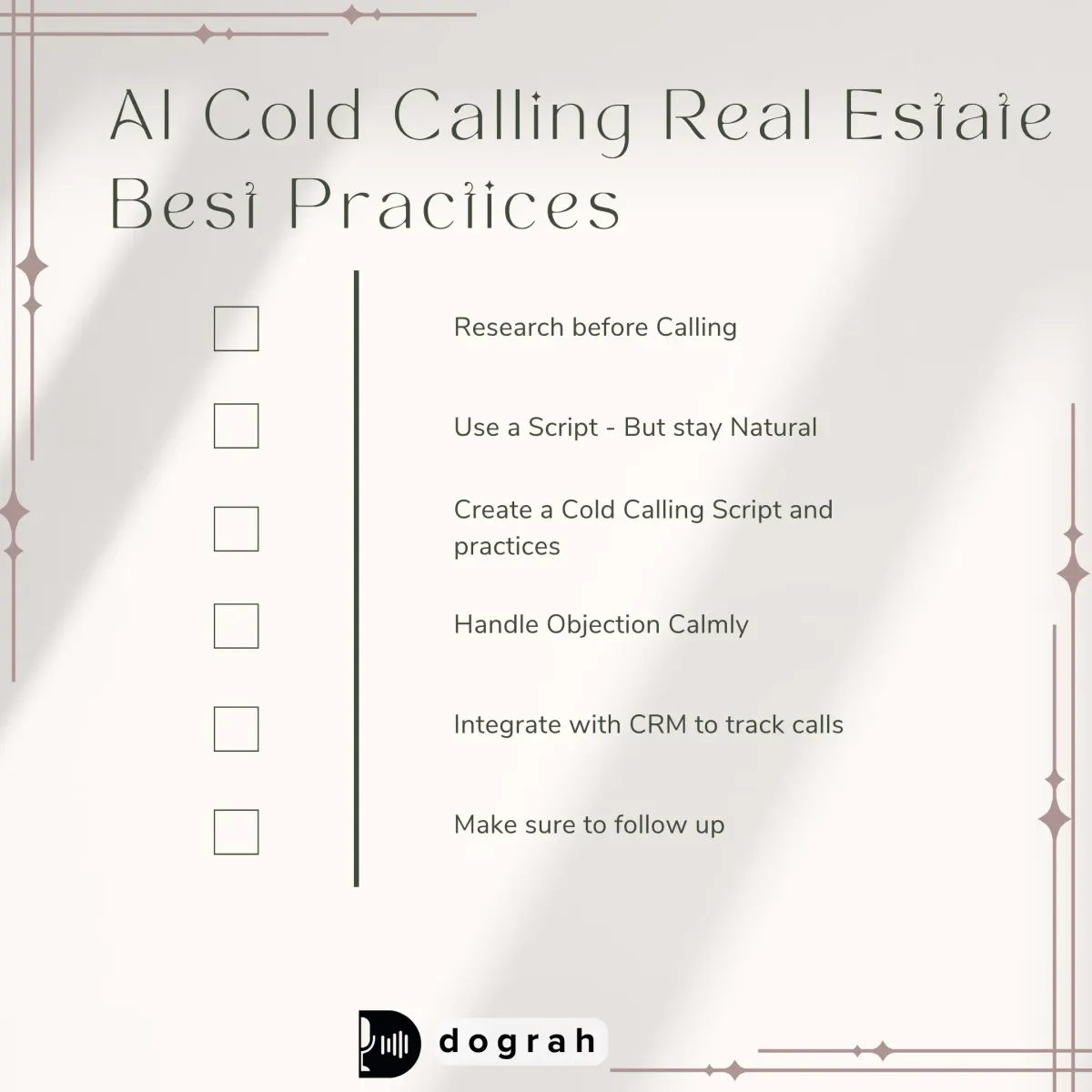
AI Cold Calling Real Estate Script & Best Practices | Boost Leads with Voice AI
How to Choose Between so many Vapi AI Alternatives ?
When selecting a Vapi.ai alternative, keep these key factors in mind, and Dograh standing out across multiple areas:
- Open Source: Dograh offers cost savings, data control, and flexibility with open-source solutions.
- Reliability: Building a reliable voice bot is not trivial and hence Built-In AI Testing and self improving bots can help reduce errors and also with faster time to market.
- Budget: Choose a platform with transparent, all-in-one pricing. Dograh and Insighto.ai offer more cost-effective options compared to Vapi’s layered hidden fees.
- Ease of Use: For non-technical teams, platforms like Dograh, Tabbly, and Voiceflow offer intuitive no-code, drag-and-drop builders to quickly launch voice agents.
- Scalability: If you're aiming for high-volume use, Dograh and Dasha.ai deliver strong infrastructure support and uptime performance.
- Integrations: Dograh, Tabbly, and Synthflow integrate smoothly with CRMs, ERPs, Slack and other business tools for streamlined automation.
- Multilingual Support: Dograh and Dasha.ai offer robust language capabilities, making them ideal for teams serving a global audience.

The Ultimate Guide to AI Calling Implementation - By Dograh AI
Getting started with Dograh AI
Interested in leveraging Dograh for lead generation, cold calling or business automation ? Here’s a streamlined path to getting started, along with direct links to essential resources :
1. Sign Up for Dograh
Dograh Sign Up & Platform Homepage
2. Quick Start Instructions
How to Build AI Voice Agent - Step by Step with Dograh
This guide walks you through using Dograh’s no-code drag-and-drop builder to easily set up real estate or customer calling workflows.
3. Tutorial : No Code Voice Agent Creation
How to Build AI Voice Agent with No Code ( Step - by - Step )
Discover how to easily create agents, design workflows, and integrate CRMs using Dograh code-free, with real business examples included.
4. Book a Demo
Schedule a personalized walkthrough with Dograh experts
Book a demo to see how Dograh can support your business needs like automating real estate leads or customer support with tailored insights and a live walkthrough.
Alternative Resources
The Ultimate Guide to AI Calling Implementation by Dograh
Related Blog
- Discover the Top AI Communities to Join in 2025 for innovation and collaboration.
- Learn what makes Voice-Enabled AI Workflow Builders Effective in 2025.
- Discover how Making AI Outbound Calls Work: A Technical Guide for Call Centers can streamline automation and boost call efficiency.
- Explore AI Outbound Calling in 2025: What Actually Works Now to learn proven strategies for effective, real-world voice automation.
- See how 24/7 Virtual Receptionist Helps Small Firms Win More Clients by boosting responsiveness and improving customer engagement.
- Learn how How Call Automation Cuts Outbound Calling Costs by 60%: Virtual Assistant Guide can transform your call center’s efficiency and savings.
- Check out "The Ultimate Guide to Reduce Speech Latency in AI Calling [Proven]" for expert tips on making your voice agents faster and more responsive.
FAQ's
1. Is VAPI worth it ?
VAPI can be useful, but many users report hidden charges that make it costlier than expected, it is built for developers.
2. What is the open source alternative to BetterStack ?
An open-source alternative to BetterStack is Dograh AI, which offers flexible, transparent automation for monitoring and voice AI without hidden costs.
3. Is Vapi HIPAA compliant ?
Yes, Vapi is HIPAA compliant, meaning it can securely handle sensitive healthcare data in line with regulatory standards.
4. Which is the best open source ?
The best open-source option is Dograh AI, offering transparent automation and multi-agent voice testing, with LoopTalk for advanced scenario testing.
5. What is the open source alternative to make AI ?
An open-source alternative to Make AI is Dograh AI, which enables automation and multi-agent voice workflows with full transparency and flexibility.
6. Is Vapi AI expensive ?
Yes, Vapi AI often turns out expensive, as users report hidden charges that make the final cost higher than the base rate advertised.
7. What is VAPI AI used for ?
VAPI AI is used for building and deploying AI-powered voice agents that can handle customer calls, outreach and automated conversations efficiently.
Was this article helpful?


